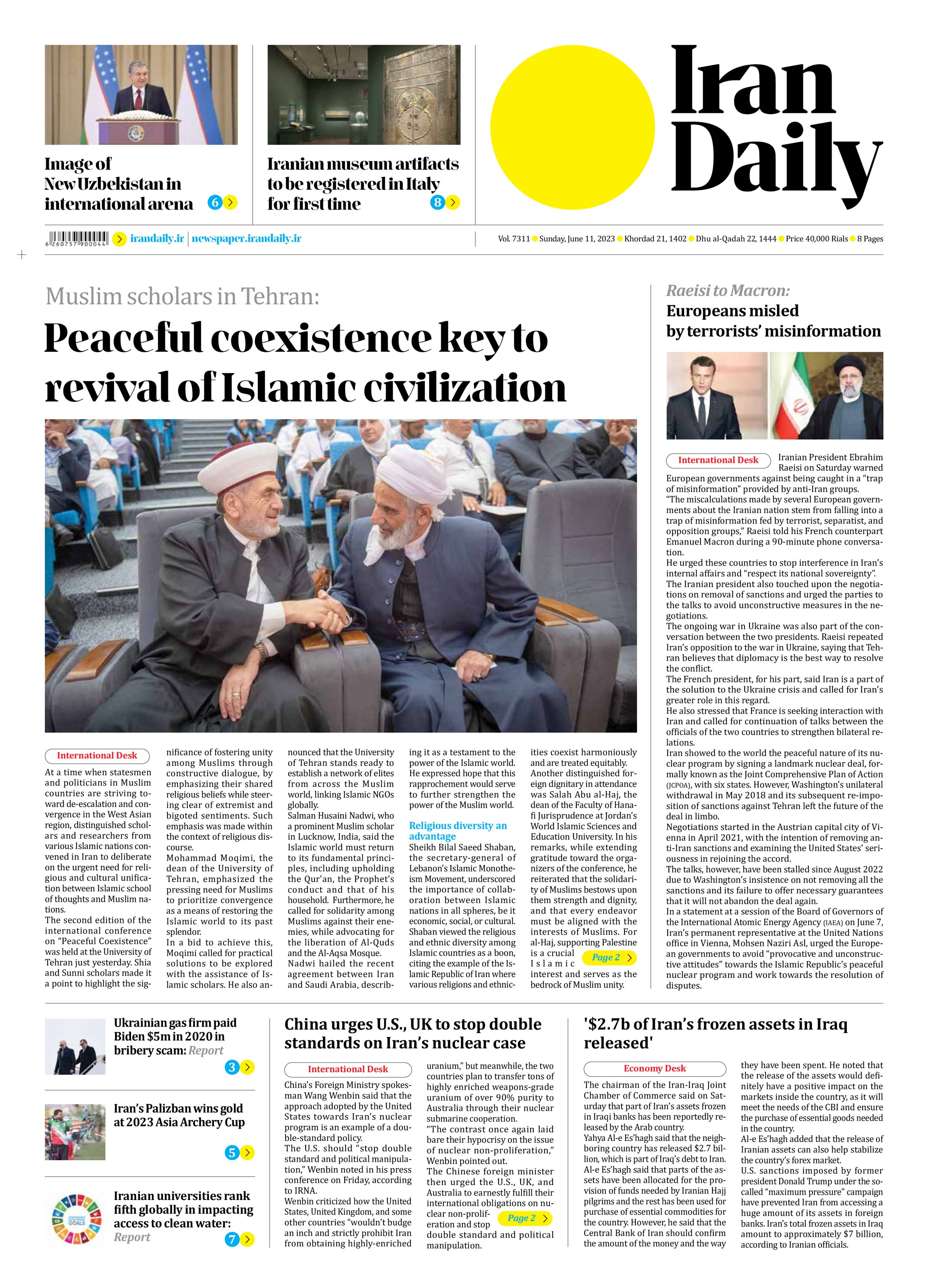
Muslim scholars in Tehran:
Peaceful coexistence key to revival of Islamic civilization
At a time when statesmen and politicians in Muslim countries are striving toward de-escalation and convergence in the West Asian region, distinguished scholars and researchers from various Islamic nations convened in Iran to deliberate on the urgent need for religious and cultural unification between Islamic school of thoughts and Muslim nations.
The second edition of the international conference on “Peaceful Coexistence” was held at the University of Tehran just yesterday. Shia and Sunni scholars made it a point to highlight the significance of fostering unity among Muslims through constructive dialogue, by emphasizing their shared religious beliefs while steering clear of extremist and bigoted sentiments. Such emphasis was made within the context of religious discourse.
Mohammad Moqimi, the dean of the University of Tehran, emphasized the pressing need for Muslims to prioritize convergence as a means of restoring the Islamic world to its past splendor.
In a bid to achieve this, Moqimi called for practical solutions to be explored with the assistance of Islamic scholars. He also announced that the University of Tehran stands ready to establish a network of elites from across the Muslim world, linking Islamic NGOs globally.
Salman Husaini Nadwi, who a prominent Muslim scholar in Lucknow, India, said the Islamic world must return to its fundamental principles, including upholding the Qur’an, the Prophet’s conduct and that of his household. Furthermore, he called for solidarity among Muslims against their enemies, while advocating for the liberation of Al-Quds and the Al-Aqsa Mosque.
Nadwi hailed the recent agreement between Iran and Saudi Arabia, describing it as a testament to the power of the Islamic world. He expressed hope that this rapprochement would serve to further strengthen the power of the Muslim world.
Religious diversity an advantage
Sheikh Bilal Saeed Shaban, the secretary-general of Lebanon’s Islamic Monotheism Movement, underscored the importance of collaboration between Islamic nations in all spheres, be it economic, social, or cultural. Shaban viewed the religious and ethnic diversity among Islamic countries as a boon, citing the example of the Islamic Republic of Iran where various religions and ethnicities coexist harmoniously and are treated equitably.
Another distinguished foreign dignitary in attendance was Salah Abu al-Haj, the dean of the Faculty of Hanafi Jurisprudence at Jordan’s World Islamic Sciences and Education University. In his remarks, while extending gratitude toward the organizers of the conference, he reiterated that the solidarity of Muslims bestows upon them strength and dignity, and that every endeavor must be aligned with the interests of Muslims. For al-Haj, supporting Palestine is a crucial Islamic interest and serves as the bedrock of Muslim unity.
Abdeljalil Ben Salem, the former president of Tunisia’s Ez-Zitouna University, highlighted that any division within the Islamic world based on the Qur’an is unacceptable and detrimental to the realization of Islamic civilization.
He said there are encouraging signs of convergence among Islamic nations, such as the recent détente in political relations between Iran and Saudi Arabia. Ben Salem insisted that political leaders must come together now more than ever, recognizing that strong unity is vital for success.
Ahmad Qashlan, a distinguished professor of jurisprudence at Syria’s Bilad Al Sham University, regarded the gathering of Shia and Sunni scholars as a major step toward achieving Islamic unity. In his view, it is essential to foster mutual respect between various Islamic sects while being mindful of the rights of others. Qashlan’s emphasis on inclusivity and tolerance resonated well with the conference participants, who were eager to explore ways to promote greater understanding and cooperation among Muslims worldwide.
Women’s role
should be increased
In her speech, Zhaleh Heidari Moqaddam, a prominent Iranian lecturer, shed light on the exalted position of women in Islam. She lamented that over time, women’s role in society has been marginalized, but she expressed hope that events such as this conference would lead to a positive change.
Moqaddam also suggested that educational programs be designed with the goal of training more female scholars, so that women can assume roles as jurists, politicians, economists, and other fields. She encouraged Muslim women to expand their jurisprudential thinking and intellectual capabilities.
Abdul Rahman Mohammadpour, a lecturer of religious sciences, cautioned that unless thinkers, artists, and academics accurately depict the true nature of Islam, some people might present themselves as representatives of the faith and, in its name, inflict harm upon fellow Muslims.
Dialogue best way to achieve convergence
In an interview with Iran Daily, Mostafa Zolfaqar-Talab, the chair of the Peaceful Coexistence conference, elucidated on the event’s objectives. He highlighted the aim of deepening the notion of convergence and unity among Islamic nations, while also emphasizing the pivotal role of women in Islamic societies.
According to Zolfaqar-Talab, women possess the potential to foster greater convergence among Islamic countries and promote the elevation of Islamic civilization.
He placed great emphasis on highlighting the religious commonalities shared by Muslims, recognizing that a focus on differences and distinctions would only hinder efforts toward achieving collective progress.
In his opinion, dialogue and interaction serve as the most effective means of attaining convergence within the Islamic world, as they are rooted in the rational principles espoused by the Prophet of Islam.
He further added that it is imperative to create opportunities for dialogue and interaction amongst Islamic elites, as well as between different nations, parties, and groups. One-sided perspectives or approaches to complex issues, he warned, can ultimately lead to greater divergence and
disharmony.







